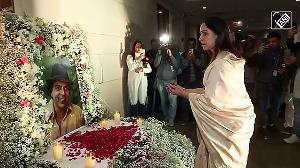
As Finance Minister Jaswant Singh readies to present the vote-on-account on February 3, it is time to take a look at his tenure in North Block that spanned a little less than 20 months.
Not many may remember that when he took charge of the finance ministry in July 2002, it was his second stint in North Block. His first stint was in 1996 and lasted for only 13 days.
Interim Budget 2004-2005: Complete Coverage
As finance minister of the first Vajpayee government that fell after failing to win the confidence of the Lok Sabha in May 1996, Mr Singh took two important decisions. One, he gave clearance to the Enron power project in Maharashtra and two, he ordered an official inquiry into a corporate house.
His second stint in North Block as finance minister would have begun much earlier than July 2002, if only powerful forces within the Rashtriya Swayamsevak Sangh had not torpedoed Mr Vajpayee's proposal.
Even though Jaswant Singh had lost the Lok Sabha election in 1998, Mr Vajpayee had decided to induct him into the Cabinet and it was reasonably certain that he would be made the finance minister. But the RSS forces questioned the logic and propriety of inducting someone into the ministry who had failed to win his Lok Sabha seat.
It was only much later that Mr Singh was included in the Cabinet and that too as the external affairs minister. Jaswant Singh relished his assignment and made significant contribution to fine-tuning India's foreign policy, particularly its relations with the United States.
So, when Mr Vajpayee wanted Jaswant Singh to take charge of the finance ministry, many of his close associates felt that he was reluctant to give up the foreign affairs portfolio. But he could not turn down the prime minister's request to 'fix' the economy just as he had 'fixed' the country's foreign policy.
Much has been written about how Jaswant Singh introduced a new style of functioning in North Block. It was clear in his mind that he was a finance minister with a political agenda. He had to package economic reforms and policies in a manner that they became 'saleable' to ordinary people and could fetch votes from them in return.
Succeed he did in this endeavour, as is clearly evident from the manner in which he has exploited the feel-good factor in the economy to the ruling party's advantage. All the decisions that he has taken in the last one month confirm that Jaswant Singh knows how to sustain the feel-good factor.
In the process, however, Mr Singh has set new equations between himself and key institutions in the government. In sharp contrast to one of his predecessors, Manmohan Singh, Jaswant Singh has paid little attention to building a team of able and competent secretaries in the finance ministry.
He made no secret of his disenchantment with the quality and calibre of civil servants around him. For months, he did not feel the necessity of having either a finance secretary or even a secretary in the department of economic affairs. He made only two notable appointments -- one of the chief economic advisor and the other an advisor to himself.
Both are economists and continue to play an important role in economic policy making in the finance ministry. For the rest, Mr Singh showed little concern.
Not surprisingly, the prime minister's office gained in strength in a scenario where the finance ministry bureaucrats were not part of the action. This shift of power from North Block to the PMO was aided by the posting of S. Narayan as economic advisor to the prime minister. Dr Narayan was the finance secretary before his superannuation and transfer to the PMO.
Indeed, the PMO played a big role in finalising the reduction in customs duty on a host of items, formulating mega investment proposals to improve infrastructure and liberalising the capital account convertibility norms for resident Indians and companies.
First, resident Indians were allowed to invest up to $ 25,000 abroad every year without any restrictions and then companies were allowed to raise foreign currency loans through the automatic route up to $ 500 million without any end-use restrictions.
The finance ministry's enthusiasm on this front led to the third change in Mr Singh's equation. And that was with the Reserve Bank of India. The newly appointed governor of RBI, Dr Y V Reddy, soon began to be perceived by the finance ministry and the PMO as a conservative regulator who would not blindly play along the government's strategy to spread the feel-good factor all around. On the question of liberalising norms for companies raising external commercial loans, the central bank had some reservations.
These were genuine reservations from a RBI governor, which came from his long experience of having managed the country's crisis-ridden balance of payments situation -- both as a senior official in the finance ministry and also as the deputy governor in the central bank.
Clearly, the finance minister brushed aside these reservations and in the process set a new equation between the finance ministry and the central bank. Only time will tell if these new equations were good for the economy.




